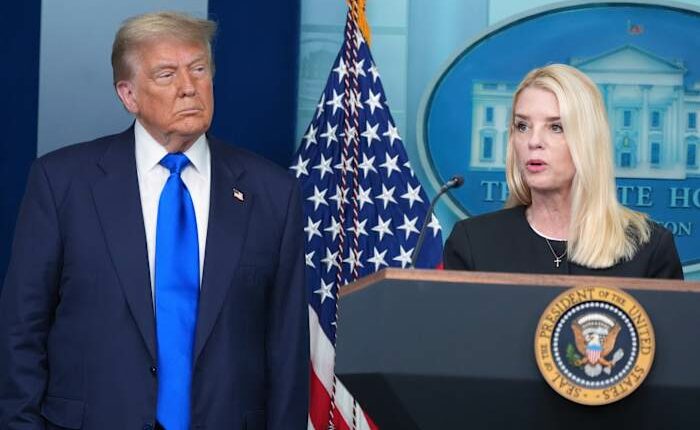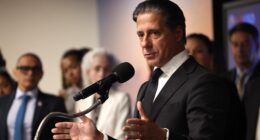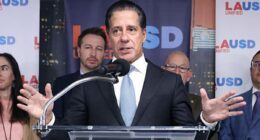Share this @internewscast.com

WASHINGTON – News has emerged that Attorney General Pam Bondi is set to launch a criminal probe into the origins of the Trump-Russia investigation from the Obama era. This indicates that one of the most examined and politically divisive chapters in recent American history will once more be subject to scrutiny.
Here’s a look at what’s known and not yet known about the latest Justice Department revelation:
A saga with a long backstory
Perhaps nothing infuriates President Donald Trump more than the intelligence community’s conclusion that Russia meddled in the 2016 election to his advantage, coupled with law enforcement investigations into potential collusion between his campaign and Moscow to influence the election results.
The investigation led by Robert Mueller, a former FBI director appointed as special counsel by Trump’s initial Justice Department, concluded that Russia had conducted an extensive operation benefiting Trump and that the Republican’s campaign had welcomed this assistance. However, Mueller did not uncover enough evidence to prove a criminal conspiracy between Russia and the Trump campaign.
As he returns to the presidency, Trump has made it clear that he wishes to use the Justice Department to retaliate against political opponents he believes have tarnished his image, including advocating for the imprisonment of Obama-era officials.
The current administration, now more broadly spanning multiple agencies, is attempting to revisit the widely accepted finding — acknowledged by notable Republicans — of Russian interference and is scrutinizing the officials involved in formulating that conclusion.
A Bondi grand jury directive
Bondi, a staunch Trump supporter, has instructed Justice Department prosecutors to submit evidence pertaining to the Russia investigation to a grand jury. Grand juries are utilized by prosecutors to issue subpoenas for records and testimonies, and they can lead to indictments based on the evidence assembled.
The bar is low for an indictment given that the presentation of evidence by prosecutors is one-sided, though grand juries do have the option to decline to indict and have done so in the past.
A person familiar with the matter confirmed Bondi’s directive to The Associated Press but key questions remain.
It was not disclosed, for instance, which prosecutors are pursuing the investigation, where the grand jury that might hear evidence is located and whether and when law enforcement officials might seek to bring criminal charges.
The Justice Department, in an unusual statement last month, appeared to confirm the existence of an investigation into former FBI Director James Comey and former CIA Director James Brennan but provided no details or specifics.
Potential targets of probe remain unclear
It’s not clear who might be targeted in the investigation, but the Trump administration has been aggressively challenging intelligence community conclusions about Russia’s actions and intentions that had long ago seemed settled.
It’s been a welcome diversion for the administration as it confronts a wave of criticism from Trump’s base and conservative influencers over the handling of records from the Jeffrey Epstein sex trafficking investigation.
In the last month, Trump administration officials and allies have released a series of documents aimed at casting doubt on the extent of interference and at portraying the original Russia investigation as an Obama administration frame-job.
The documents have been hailed as incontrovertible proof of a conspiracy, but a close inspection of the records shows they fall well short of that.
Among the documents released by Tulsi Gabbard, the administration’s director of national intelligence, are emails from 2016 showing that Obama administration officials recognized in 2016 that Russians had not hacked state election systems to manipulate votes in favor of Trump.
But the absence of evidence that votes were switched — something the Obama administration never alleged — has no bearing on the ample evidence of other forms of Russia interference, including a hack-and-leak operation involving Democratic emails and a covert social media campaign aimed at sowing discord and spreading disinformation.
Last week, Sen. Chuck Grassley, the Republican chairman of the Senate Judiciary Committee, released a previously classified annex of a 2023 report by John Durham, the special counsel appointed by the first Trump administration to hunt for government misconduct in the Russia probe.
The annex included a series of emails, including one from July 2016 that was purportedly sent by a senior staffer at a philanthropic organization founded by billionaire investor George Soros, that referred to a plan approved by then-Democratic presidential candidate Hillary Clinton to falsely link Trump to Russia.
But Durham’s own report took pain to note that investigators had not corroborated the communications as authentic and said the best assessment was that the message was “a composites of several emails” the Russians had obtained from hacking — raising the likelihood that it was a product of Russian disinformation.
Fresh scrutiny has also centered around the intelligence community assessment on Russian election interference, which was published in January 2017. An annex in a classified version of the assessment contained a summary of the so-called Steele dossier — a compilation of opposition research that included uncorroborated rumors and salacious gossip about Trump and Russia.
The latest in a series of investigations
Just as Russian interference has been heavily scrutinized, so too has the U.S. government’s response to it.
Multiple government reports, including not only from Mueller but also a Republican-led Senate intelligence committee that included current Secretary of State Marco Rubio, have documented Russia’s activities in sweeping details.
To be sure, reports from the Justice Department inspector general and Durham also identified significant flaws in the FBI’s Russia investigation, including errors and omissions in applications the Justice Department submitted to a secretive surveillance court to eavesdrop on a national security adviser to the 2016 Trump campaign.
But Durham found no criminal wrongdoing among government officials, bringing three criminal cases — two against private citizens that resulted in acquittals at trial and a third against a little-known FBI lawyer who pleaded guilty to doctoring an email.
It is unclear if there is any criminal wrongdoing that exists that Durham, who launched his investigation in 2019 and concluded it four years later, somehow missed during his sprawling inquiry.
Copyright 2025 The Associated Press. All rights reserved. This material may not be published, broadcast, rewritten or redistributed without permission.










